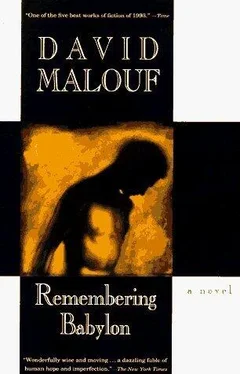Under the hard conditions of life up here neighbours were important, and over the last years he and Barney had become more than that. Their huts were visible, one from the other, through the half-cleared forest — or at least the lights were. Polly Mason was Ellen’s best friend. The children, when they had no chores to do, went off together on adventures in the scrub, swapped treasures, had quarrels that kept them apart for a day or two but were soon patched up. They had never worried about fences or boundaries. So when they took Gemmy on, the Masons too were affected, and Barney did not like it. Gemmy was warned against straying across on to the Masons’ land, and so far as Jock knew, complied, but Barney, in his anxious way, was forever out there pacing the line and looking for signs of trespass; except that there was no line, and the trespass too might be no more than a shadow on Barney’s thoughts, and how could you deal with that ? All he could do was meet the ritual complaint with ritual reassurance, and hope that conversation, which was slow up here, with many pauses that easily took the place of words, would have moved on under their long-drawn silence and when it resurfaced hit a new topic. But on this occasion he had no luck.
‘Yair well,’ Ned Corcoran put in after a longish gap, ‘I dunno about that. You’d be the best judge a’ that, Jock, you an’ Barney. How harmless the cove is. Seein’ yer all so close. On’y I woudn’ want ‘im hangin’ roun’ my place. Coudn’ sleep at night — I k’n hardly sleep now. I’d be askin’ meself — you know — if ’e wasn’ — you know — receivin’ visits. From ol’ frien’s.’
They shifted their boots in the dust. Jock’s heart fell. And Hec Gosper, the youth whose hammer Gemmy had wrestled for that first day, and who ever since had harboured a kind of grudge, dropped his chin to conceal a smile.
He was new among them, having just moved up from the group of half-grown boys who hung about the verandah of the store. He did not say much, he was still on trial here, but he was very observant. He had recently discovered in himself a streak of irony that he found scope for in the play that went on under the slow utterances of these fellows, but even more in the depth of their silences. It amused him, for instance, that they had begun to regard Jock McIvor, who was one of the little inner band, with a closer eye; as if he had developed a mark of difference, or some deformity had emerged in him that they had failed till now to observe.
What intrigued Hector was that Jock McIvor, who had always been such an acceptable bloke, with all the easy confidence a man derives from it, had begun to lose that magic quality. Little defensive spikes and spurs appeared in him that surprised the others and increased a suspicion that they might somehow have been mistaken in him.
Hector owed his expertise in these matters to his lip, though it otherwise offered no impediment to his view of himself (and especially since it had begun to be obscured with the softness of a moustache) as a flash young fellow and potential dandy, if he could only get away to Brisbane, or any place in fact with barbershops, pool rooms, buggies in the street, and of an evening the glow of streetlamps and the clicking on the pavement of women’s heels. He saw himself in tall boots with a yard of ribbon behind his hat, but stood meanwhile, barefooted and with his head down, stroking the hair on his lip, while Ned Corcoran, who was persistent, led them back to where they had stuck.
‘Yair, well,’ he said, ‘it’s the wife I’d be worried about. If it was me. You know what I mean? Gracie.’
There, Hec thought, Jock McIvor. What now, eh?
He had no malice towards Jock. Malice was not in his nature. It was the spectacle itself that drew him, the discovery, which was new, that there might be more in the world to dwell on than just himself.
Jock swallowed hard. He restrained himself from replying that Gracie Corcoran, unlike his own wife, was a mouse, if not a bandicoot. But it saddened him, all this. He felt the knot in his throat as a hard little nut of injustice. That the others did not come to his aid — Jim Sweetman for instance, who merely looked embarrassed and turned away. That Ned Corcoran, a man for whom they had no respect, should be glancing about now with such cocky assurance that he had hit the mark and was being listened to.
None of what followed was new, though it wounded him just the same; they were not original, these fellows. What surprised Jock was that not so long ago he would not have seen it, and if he had would have found reassurance in their being so easily predictable. He had begun lately to be critical, even of Jim Sweetman, and he did not want to be. He did not like the experience, which was new, of seeing his friends from a distance, of finding them on one side and himself on the other, and the knowledge that if he was seeing them with new eyes, he too, since the distance must work both ways, had become an object of scrutiny. He was disturbed, most of all, by the view this gave him of himself . As if there was something in him that justified scrutiny. That he might be less open than he appeared.
Watching Jock’s difficulty with Gemmy, the terror, which was almost comic, into which he was thrown by the poor fellow’s extravagant bursts of feeling, Ellen McIvor found herself taken back to a vision of Jock that had been obscured in these last years by the hardships they had been through. She had been attracted then by a quality in him that went oddly with his big frame, and must, she thought, be what other women too were drawn to, a mixture of forcefulness and almost girlish modesty.
Work in the outdoors had burnished him; he was ruddy. His flesh, when his sleeves were rolled, had none of the dead marble whiteness she knew from her brothers and associated with the sunless world underground. It glowed. You felt the heat of it right through his shirt. It carried a scent of grass and clean sunlight she had longed for all her life, or so she believed, in the dismal world she had grown up in, where everything was smudged and smirched with coal dust and even the air you breathed was gritty, and the taste in your throat always of tar.
He had wanted them to go to Canada. That was what he offered, along with himself. But when they got down to it, Australia seemed the larger choice. There was land there and sunlight (she could not wait) and spaces, he told her, they could barely conceive of here. But she could. Sunlight and space were the first things she had glimpsed in him.
They arrived in Brisbane in a January swelter. The town, its muddy streets made passable by duckboards, its houses, huts rather, mere makeshift affairs of bark and iron among dark, glossy-leaved figs, was a low place, sunk in a steamy torpor where everything the flesh touched was damp and the flesh itself damper, and the air had a sweetish smell just this side of putrescence. The drunkenness they met in the streets had a desperation to it that made her wonder what there might be in the place, given so much space, that could madden the men and made the women so pinched and colourless. It was not what they had expected. Jock turned gloomy, and she saw for the first time then that the sunniness she had seen in him was not his real nature. She was the one who had to insist that the heat was not too bad, or the steamy rain when it gushed down, or the clouds of mosquitos that blew in from the mangrove-choked islands in the river’s mouth, and whose bites made his eyelids swell; or the cockroaches, big as wrens, that came flying in at every open window and ran over their faces in the dark; or the delays. A different kind of balance was established between them in these first days in the colony, as if, in coming halfway round the world, they had arrived not so much at a new place as a new accommodation with their own natures.
Читать дальше












